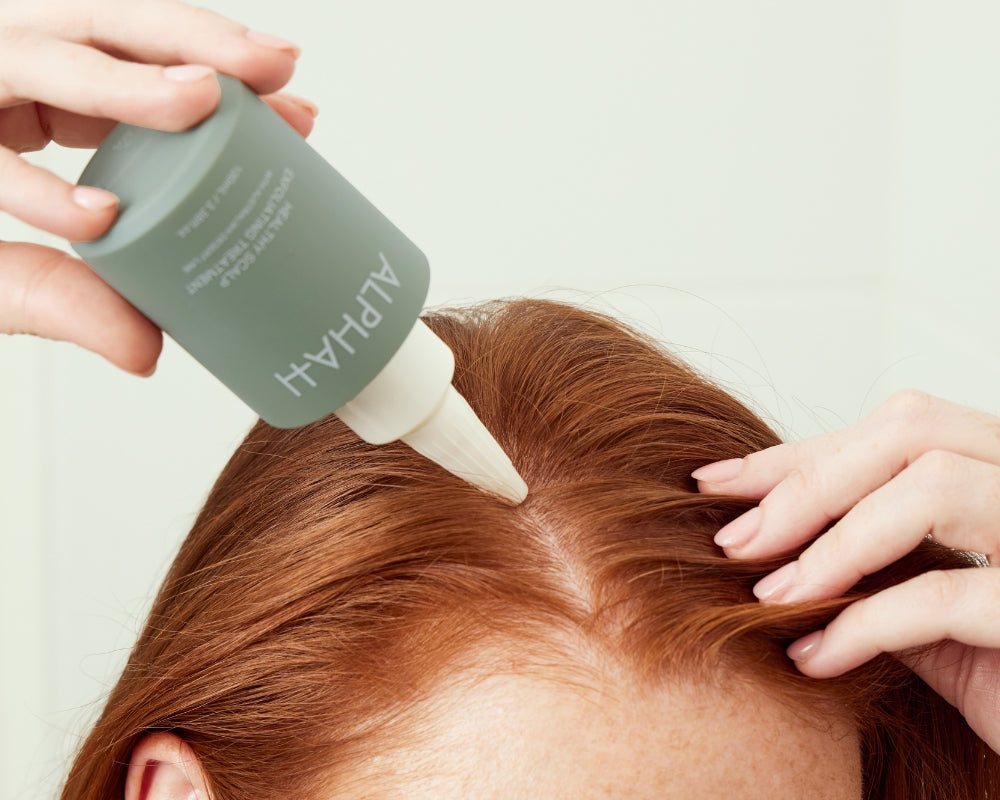Why a hair growth expert wants you to stop using your scalp scrub.

This might be controversial…
But according to a hair doctor, known as a trichologist, that scalp scrub you’re using might be making your dry scalp, oily scalp or hair growth troubles worse.
This is exactly why we decided to interview a scalp and hair growth expert when formulating the Alpha-H Healthy Scalp Exfoliating Treatment.
No marketing jargon or TikTok ‘trends’. Just straightforward information based on clinical insights and scientific evidence.
Below, Dr Dominic Burg (PhD) answers all your hair growth and hair scalp treatment questions, including what to use instead of a scalp scrub.

Q: Are scalp products necessary, or is it just another fad?
A: The only beauty product anyone needs is SPF, but skincare for your scalp is more than a trend.
“Once your hair has left the scalp, it is essentially just a dead fibre. The alive part [responsible for healthy hair] lives in the scalp,” Dr Burg says.
“If your scalp environment is not healthy, if it has excess inflammation or oxidative stress, then your follicles won’t be working optimally to grow thick, healthy hair.”
Q: Is it possible to achieve thicker, healthier hair without a healthy scalp?
A: No, and here’s why:
- “The source of your hair is the scalp. Hair follicles live on the scalp and are the tiny organs that grow hair.”
- “All the messages and nutrients that help hair grow are transported through the scalp.”
- “If there is inflammation or oxidative stress [on the scalp], the balance of these signals can change and disrupt the hair growth cycle.”
- “This leads to a reduction in quality of hair, which can lead to hair loss and thinning.”
Q: Do you need to exfoliate your scalp?
A: Dr Burg says it’s important to help scalp skin cell turnover with regular exfoliation.
“A build-up of cells and oils [on the scalp] can lead to imbalances, irritation, and inflammation, which can impact the scalp environment, thus affecting hair growth.”
Watch the video below to learn more.
Q: Are scalp scrubs good for your hair and scalp?
A: This might come as a surprise, but Dr Burg believes gritty scalp scrubs that exfoliate using grainy particles “can actually do more harm than good”.
“Physical exfoliation can inflame the scalp, which isn’t great for the hair follicles. It can also dislodge growing and resting hairs prematurely, particularly in those with hair growth issues or thinning.”
“Some physical exfoliants strip away too much oil, which can lead to scalp dryness or an overproduction of oil as a response.”
He says scalp scrubs should be used sparingly, and that chemical exfoliation is the better approach for the scalp.
Q: Should I use Glycolic Acid or Salicylic Acid on my scalp?
A: According to Dr Burg, using a chemical exfoliant containing exfoliating acids, like Healthy Scalp Exfoliating Treatment is a better approach than a scalp scrub.
Both Glycolic Acid and Salicylic Acid will help the scalp shed dead skin cells, but Salicylic Acid is more effective because it is oil soluble.
This means it can break down oil and dissolve the bonds holding dead skin cells on the scalp together, no harsh scrubbing required!
“Use chemical exfoliants that are either targeted to the scalp, or formulated in such a way that they don’t impact the integrity of the hair fibre, strip colour, or damage the waxy protective layer of the hair.”

Q: Can hair colouring, styling tools and products like dry shampoo affect your hair growth?
A: Maybe… here’s what Dr Burg says:
- Hair colouring: “If bleaches and dyes contact the scalp, it can lead to inflammation, which impacts hair follicle health and hair cycling.”
- Heat tools like hair dryers, hot air brushes and straighteners: “Excess heat not only damages the hair fibre, but if used close to the scalp, they can lead to inflammation and irritation.”
- Slick buns: “Tight hairstyles can damage the small muscle connected to each hair follicle, which can lead to follicle death and a type of hair loss known as traction alopecia.”
- Dry shampoo: “Product build up on the scalp can impact your microbiome and follicles, which may lead to a reduction in hair quality and hair cycle changes over time. The build up can also affect cell turnover and shedding, leading to itchiness and irritation.”
Q: Is the skin on your scalp the same as the skin on your face?
A: Essentially, yes! According to Dr Burg:
- Scalp skin ages just like the skin on your face – it becomes thinner and drier, which can make hair look dry and less lustrous
- Same as the face, ageing causes the “regenerative stem cells to dimmish [or slow down], leading to hair thinning and hair loss.”
- Scalp skin tends to be oiler because each hair follicle has more active oil-producing glands
- Dead skin cells on the scalp don’t shed as easily as they do on the face – you can get blocked pores on your scalp, but unlike the face, these dead cells sometimes stick together in large clumps
- The scalp microbiome is more prone to imbalances than your face skin microbiome (mostly because it’s oilier)
- When your scalp microbiome is out of whack, it may cause “an overgrowth of yeasts that can irritate the skin of the scalp, increasing cell turnover and leading to dandruff.”
Dr Dominic Burg (PhD) is a hair scientist, trichologist and molecular biologist with expertise in hair and scalp health, particularly the hair growth cycle. Dr Burg provides regular opinion and comments for leading publications such as Cosmopolitan, Elle, Byrdie, Well and Good, Women’s Health and The Zoe Report.
- Tags: all Skin Science
